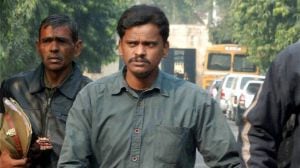Pooja,Sunita,Kiran three women,different degrees of Empowerment
The Yadav troika of Mulayam,Lalu and Sharad will do anything to block the Womens Reservation Bill. Soon after it was was passed in the Rajya Sabha,The Sunday Express travelled to their bastionsSaifai in Uttar Pradesh and Madhepura in Biharand found womens empowerment at the Panchayat level slowly changing the face of local politics
Saifai
Mulayam Singh Yadavs turf
Pooja Devi,44,was elected sarpanch from Larkhaur on a seat reserved for women,but villagers address her husband Avadh Kishore Agnihotri as pradhanji. They call Pooja Devi pradhanin,or the woman of the pradhans family. Larkhaur is about five km down the dusty road to Jaswant Nagar from the shiny and pampered oasis of Saifai,the village Mulayam Singh Yadav calls home; it falls in the Jaswant Nagar Vidhan Sabha constituency currently represented by his brother Shiv Pal Singh Yadav.
Uttar Pradesh is scheduled to host the fourth round of elections later this year after the institution of 33 per cent reservation for women in tandem with caste-based reservation in all three tiers of the panchayati raj system,but the language of discrimination against the elected woman representative is writ large. Mostly,it accurately mirrors the distribution of power in the household of the pradhan.
But Pooja Devi doesnt see it that way. They call him pradhanji to give him barabari (equal billing) with me,so that he doesnt feel slighted, she insists.
At home,Pooja Devi doesnt sit down in the presence of her elder brother-in-law or sister-in-law. For her work as pradhan outside the house,she depends on her husband to drive her around on his motorbike. The first she sees as a small compromise for keeping peace in the house: There is a big difference between the city and the village. Here,some things dont change,and appearances must be kept up,especially at home, she explains. The second,she dismisses as matter of practical necessity: How else will I go? There is no public mode of conveyance available to me. So my husband must take me to the meetings. All 34 woman pradhans of Saifai block,she points out,are accompanied by either their husbands or their sons to these meetings.
But unlike most of the other woman pradhans,she doesnt look to her husband for anything else,says Pooja Devi. He is a simple man,he will easily say yes to everything,while I can assess whether the decision will have negative consequences. In domestic matters,the last word is usually mine. Even outside the house,when the matter is complex,I tell him to stay away.
One such tangled issue came up a few months ago,she recalls. A girl from the village was adamant on marrying a boy from the same village. Both sets of parents were violently in opposition. I assured the girl I would get her married to the boy of her choice and I told the parents to keep searching for another boy. Then I sent the boy to DeIhi for a few days and told the girl he had run away because he couldnt take the pressure. Soon enough,the girl agreed to marry the boy her parents had chosen for her, she says. The matter never reached the police. And my husband still doesnt know anything about this, she says,chuckling.
She was a problem-solver before she became the pradhan,she says. But now people listen to me more. Women have their own way,she says. Even when I walk around the village,I go inside the homes. Men stop at the door.
Pooja Devi is confident of dealing even with village matters considered less womanlyviolent disputes that have made their way to the police thana,property and pension matters,pressing demands for pucca houses,or for NREGA and BPL cards. She spends much of her time dealing with the last,she says. Everyone wants a card,even if they dont qualify. In NREGA,they all want to be paid without having to work.
It hasnt been smooth sailing for Pooja Devi. Men in the village,especially the elder ones,are still wary of her and even hostile. The antagonism is on display a little distance from her house,where all the men gathered outside the small corner provision shop aggressively criticise their woman pradhan. She just sits at home,and has done nothing in five years, says Raghubir. Its a man job, says Anil.
Inside her home,though she has tried to balance her duties as wife,mother of four and bahu in a joint family of 15 relatives and 12 animals,with her responsibilities as pradhan,there has been a price to pay. If I have to go for a meeting,I speed up the housework,change my pooja timings,or sleep later, she says. She has stopped talking to her younger brother-in-law,she says,who initially encouraged her to contest for the post of pradhan and then once she was elected,tried to wield power through her. I made it clear that he couldnt interfere, she says.
Pooja Devi has a rare self-possession and a keen sense of her own difference in the rural UP landscape. She is upper caste,though in a Yadav-dominated belt,and has a supportive husband; as Inter pass she is better educated than most women in her village; and her imagination of the city comes not just from TV but also from memories of Banaras,where she was born. Yet for all that,she knows she could not have become pradhan if the Larkhaur seat had not been reserved for women in 2005.
I could not have fought the election on a general seat, she says. Now,at the end of a five-year term,there is no going back. Now she can put words to the dream she has silently nursed through the years.
In a low voice,so that the family members cannot overhear,she shares her dream: to be elected as MLA. She has told no one about it,except her younger sister,who is married in Divyapur on the other side of Etawah. After another term as pradhan… who knows… whats the harm in thinking? she says.
lll
On the other side of Saifai from Larkhaur,seven km down the road to Jamunabagh,Sunita Kumari from the OBC Shakya caste is much more typical of UPs woman pradhans. She has studied up to class VIII and was elected from the reserved womens seat of Biyari Bhatpura in 2005. In Biyari as in Larkhaul,it is the husband who is called pradhanji. But Santosh pradhan,as Sunita Kumaris husband is widely known,is a constant and dominant presence by his wifes side.
His mobile rings incessantly on matters related to the pradhans work,while she sits silent,showing no apparent curiosity. She bustles around the housewashing utensils,frying puris,packing off her young son to Mainpuri where he studies now that the Holi holidays are overwhile he deals with village matters. I can do the easy parts, she offers as explanation,but I need his help for the rest.
Before the Biyari Bhatpura seat was reserved for women,Santosh Kumar was the pradhan from 2000 to 2005. She helped me with my election campaign,so she has political experience, he prompts her. I was not afraid when he said I must contest, she says on cue.
Now,even if the seat is dereserved in the next election,he says,he will field his wife for the seat instead of contesting again for pradhan himself. If this seat had not been reserved for women in 2005,I would not have put up my wife. But now it is to my benefit that she stays in politics. She can look after the village while I can venture outside. In other words,he can continue to rule the village by proxy while pursuing a larger political imprintin the zila parishad maybe,or I will continue with my social work, he says. Kumar is block president of the Samajwadi Party.
He tells his wife to bring out a framed photograph taken last year after the gram panchayat of Biyari Bhatpura won the Presidents award,the Nirmal Gram Puraskar,for attaining full sanitation coverage in households. She motivated people to build toilets in their houses, he claims. The photograph shows both husband and wife holding the shield between them.
There have been changes in Sunita Kumari,says her husband,since she became pradhan. He offers an example: If earlier I would buy her a sari of Rs 400-500,now I look for something worth Rs 1,000-1,200. She asks for things with greater confidence. And now I take her around with me more.
But there may have been other changes over these last five years as well. Recently,Sunita Kumari has asked her husband for a mobile of her own. And she would want to contest again for pradhan,she says. Why not? Because I like meeting people. Sometimes she feels like giving it up,especially as elections draw closer. I dont like it when there is party politics and violence. But now that I have stepped out into the neta nagri,I dont want to go back to being alone at home. After her election in 2005,she recalls with obvious pride,a lady police officer had escorted her in a government car back home from Saifai.
Madhepura
Lalu Yadav and Sharad Yadavs bastion
SANTOSH SINGH
AS Kiran Devi,the mukhiya of Nabhatta West panchayat,walks towards Balaha,a Brahmin tola (neighbourhood),an elderly woman calls out to her daughter. Mukhiyan aayal chhay,ek paan lele aao (the headwoman has come,get a paan for her.) The gesture is significant,striking at the caste wall that Kiran Devi,a Paswanan extremely backward caste (EBC)and daughter of a labourer,first breached in 2006,when she was elected mukhiya in an upper-caste-dominated panchayat in Madhepura. Fifty per cent of panchayat seats in Bihar are reserved for women. Devi says,I feel more empowered because I have won from an upper-caste-dominated constituency. Of the panchayats 13,000 voters,only 250 were from Devis caste.
Madhepura is represented by JD(U) leader Sharad Yadav in the Lok Sabha and in the past,RJD chief Lalu Yadav has won from hereboth of them are vehemently opposed to the Womens Reservation Bill. But in Nabhatta,Kiran Devi is busy getting work done,trying to change the lives of others around her.
Devis working day begins at 7.30 a.m.,when she enters an outhouse she has recently got built as a sort of public hall. A group of women is already there with their grievances. Devi listens attentively to Sahrul Ray,who was beaten up by a neighbour,and assures her of a patch-up. We will not let you go to the police over petty fights, says Kiran Devi. Next she hears out Phulo Devi,who leads a group of women who want a hand-pump installed near their house. Devis husband Ashok Paswan,a district councillor,watches the proceedings from a distance. He says he is proud to see his wife coming out of his shadow. Devi,meanwhile,says she occasionally seeks guidance from her graduate husband but he never interferes with her work.
After half an hour,Kiran Devi gets up to leave to inspect some ongoing work and to interact with villagers,when a group of wrestlers comes visiting,singing praises of her. Once a popular sport in rural areas,wrestling is dying out in villages now,forcing wrestlers to perform tricks and asans to earn money. Devi says she has no time but they want just 10 minutes. A sympathetic Kiran gives them Rs 500 at the close of the show.
At 8.30 a.m.,her assistant starts his motorcycle and Devi hops on to visit Nabhattas primary school,where a parapet for a kitchen is being built. She has got Rs 2 lakh for the construction under the Backward Region Grant Fund (BRGF). A mukhiya gets direct Central funds under NREGA,BRGF and the 13th Finance Commission. State government funds come under old age pension,Kanya Vivah Yojna (Rs 5,000 per wedding in an EBC family) and Kabir Antyesti Yojana (Rs 1,500 for cremation). A mukhiya also gets to appoint panchayat teachers.
Devi,who has got NREGA work worth Rs 70 lakh done in the last four years,says proudly: The real sense of empowerment comes when I sign an NREGA cheque. I have so far utilised Rs 15 lakh under the BRGF to construct roads and repair community buildings.
She has so far appointed 22 panchayat teachers and started a new primary school at the minority-dominated Navlakha. The villages of Gorpar,Sharma Tola,Nablakha,Balwa and Dhenga come under her panchayat.
Her next stop is Gorpar village,where women leave their domestic chores to welcome her with folded hands. Some even touch her feet,much to her embarrassmentshes just 36. Gorpar has over 30 new Indira Awas houses and over half a dozen toilets under construction. Lalita Devi,a villager,says: She visits regularly and attends all social functions. Kiran Devi,meanwhile,visits a family whose three children,all below 10,lost their mother recently. I want them to get into school so that they can get an education and meals. It is hard to see an eight-year-old boy cooking for two younger siblings, says Devi.
Waving at the women,Kiran Devi drives off to the Sharma tola and then to Navlakha with its 80 Muslim households. She greets an elderly woman,gently admonishing her for smoking a hookah. Give it up,its a bad habit, she advises her. It will only go with my death, the old woman smiles back.
Some distance away,an open-air class is being held. The panchayat teacher welcomes Devi,requesting her to ensure the schools land is registered quickly. In the neighbourhood,Devi visits Mohammed Salim,who suffered a paralysis attack recently. Hazra Khatun,a villager,says: We are proud that we have a woman mukhiya. She connects well with both men and women.
The last stop in Devis tour is Balwa,where some women want to know when they will get their old-age pension. She tells them that 171 fresh sanctions have been made. A woman gets her a traditional mithila paan while another wants to cook desi fish for her. But Kiran Devi has more work waiting for her at homeshe usually keeps the second half for her day for paper work.
Back home in the afternoon,she helps her sister-in-law fry fish for lunch. Meanwhile,another group of people has assembled at her outhouse with a list of complaints. Since a lot of bade log (important people) also visit her now,Kiran Devi has recently got a western-style toilet built at her house.
Devis only regret is that she is not educatedthough she can read and write and draft simple letters. I have made sure that my sons and daughters get a good education, she says.



- 01
- 02
- 03
- 04
- 05




























